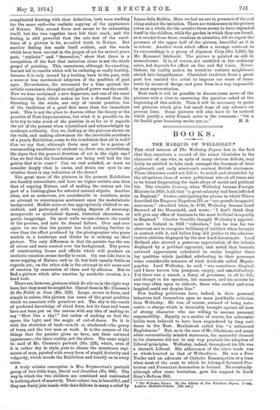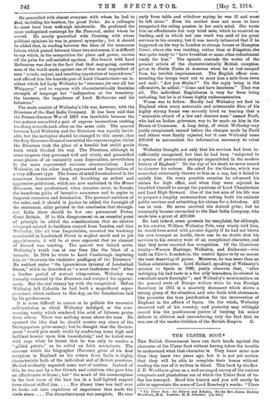BOOKS.
THE MARQUIS OF WELLESLEY.*
THE chief interest of The Wellesley Papers lies in the fact that they constitute a record of the minor blemishes in the character of one who, in spite of many obvious defects, may fairly be entitled to take rank amongst the foremost of later eighteenth and early nineteenth century British statesmen. Those blemishes could not fail to be noted and chronicled by the ubiquitous class of minor politicians who at all times are to be found frequenting the back-alleys of social and political life. The vitriolic Creevey, when Wellesley became Foreign Minister in 1810, held that " a great calamity bad been inflicted on England." Croker, anticipating the phrase in which Thiele described the Emperor Napoleon III. as " one grande incapacity meconnue," chuckled when, in 1830, Wellesley became Lord Steward of the Household, and wrote: "I don't think they will give any office of business to the most brilliant incapacity in England." Charles Greville thought Wellesley 's appoint- ment to Ireland in 1833 " ridiculous," but be was far too. observant not to recognize brilliancy of intellect when brought in contact with it, and before long did justice to the adminis- trative abilities displayed by the new Lord-Lieutenant. Lord Holland also showed a generous appreciation of the talents displayed by a political opponent, and noted that beneath outward appearances calculated to excite laughter there lay qualities which justified attributing to their possessor sonic considerable measure of what Aristotle called Angelo- psychia. Lord Wellesley, he said, " was sometimes illogical,. and I have known him pompous, empty, and unsatisfactory. Yet there was a smack, a fancy of greatness, in all he did; and though in his speeches, his manners, and his actions he. was very often open to ridicule, those who smiled and even laughed could not despise him."
Few leading politicians have, indeed, in their personal behaviour laid themselves open to more justifiable criticism than Wellesley. He was, of course, accused of being auto- cratic—a charge which is invariably brought against all men of strong character who are willing to assume personal responsibility. Equally as a matter of course, his autocratic habits were believed to have been engendered by long resi- dence in the East. Mackintosh called him "a sultanizect Englishman." But, as in the case of Mr. Gladstone and many other autocratically minded statesmen, the masterful element in his character did not in any way preclude the adoption of Liberal principles. Wellesley, indeed, throughout his life was a staunch Liberal. His abhorrence of the slave trade was as whole-hearted as that of Wilberforce. He was a Free Trader and an advocate of Catholic Emancipation at a time when most of the caste to which he belonged favoured Pro- tection and Protestant domination in Ireland. He eventually although after some hesitation, gave his support to Lord Grey's Reform Bill.
• The Wellaley Paper,. By the Editor of TM Windham Papers. 2 vole. London: Herbert Jenkins. pre. net.]
He quarrelled with almost everyone with whom he bad to deal, including his brother, the great Duke. As a colleague be must have been well-nigh intolerable. He professed the most undisguised. contempt for Mr. Pereeval, under whom he served. He nearly quarrelled with Canning. with whose political opinions he was in general sympathy ; but it should be added that, in reading between the lines of the numerous letters which passed between these two statesmen, it is difficult to say which, in the competition for place and power, carries off the palm for self-satisfied egotism. His breach with Lord Melbourne was due to the fact that that easy-going, careless man of the world made against one of the most imprudent of men " a rude, unjust, and insulting imputation of imprudence," and offered him the bumble post of Lord Chamberlain—an in- cident which led Lady Wellesley to "renounce for ever all her Whiggery," and to express with characteristically feminine strength of language her "indignation at the treachery, the baseness, the impudence of Lord Melbourne and his followers."
The main contest of Wellesley'e life was, however, with the Directors of the East India Company. It has been said that the Franco-German War of MO was inevitable because the two nations resembled a pair of express locomotives rushing headlong towards each other on the same rails. The quarrel between Lord Wellesley and the Directors was equally inevit- able, but the metaphor should be changed to this extent, that the fiery Governor-General resembled the express engine, whilst the Directors took the place of a humble but stolid goods train which blocked the way. The Directors, although in some respects they governed well and wisely, and personified some phases of an eminently sane Imperialism, nevertheless in the main represented cautious commercialism. Lord Wellesley, on the other hand, represented an Imperialism of a very different type. The frame of mind foreshadowed in the numerous hexameter lines, all breathing an ardent and aggressive patriotism, which are now enshrined in the Musae Etoneusea, was predestined, when occasion arose, to forsake the humdrum paths of lucrative commerce and to aspire to Imperial extension and domination. The personal ambition of the ruler, and, it should in justice be added, the foresight of the statesman, alike pointed to the conclusion that through- omit India there should be but one paramount Power, Great Britain. If to this disagreement on an essential point of principle be added the considerations that no electric telegraph existed to facilitate control from London, and that Wellesley, like all true Imperialists, resented the tendency manifested in Leadenhall Street to neglect merit and to job appointments, it will be at once apparent that no element of discord was wanting. The quarrel was indeed acute. Wellesley's wrath was at one time like the blast of a tornado. In 1804 he wrote to Lord Castlereagh imploring him to "frustrate the vindictive profligacy of the Directors." He writhed under "the ignominious tyranny of Leadenhall Street," which he described as "a most loathsome den." After a further period of mutual vituperation, Wellesley was formally censured by the Directors and resigned his appoint- ment. But the real victory lay with the vanquished. Before Wellesley left Calcutta he had built a magnificent super- structure, which endures to this day, on the foundations laid by his predecessors.
It is more difficult to excuse or to palliate the excessive self-landation in which Wellesley indulged, or the over- weening vanity which rendered him avid of fulsome praise from others. There was nothing mean about the man. He spurned the idea that he should receive any share of the Seringapatam prize-money; but he thought that the Govern. Anent "would gain much credit by conferring some high and brilliant honour upon him immediately," and he boiled over with rage when he learnt that be was only to receive a "gilded potato," as he called an Irish marquisate. The account. which his biographer (Torrens) gives of his first reception in England on his return from India is highly characteristic both of the individual and of British practices. He had evidently expected some sort of ovation. Instead of this, he was met by a few friends and relatives, who gave him an affectionate welcome ; but " the murk of the commonplace in the beet room of the best inn in a half-lighted seaport town almost stifled him. . . . Ere dinner time was half over he broke out into expletives of impatience that made the circle stare. . . . The disenchantment was complete. He rose early from table and withdrew saying he was ill and must he left alone." Even his mother does not seem to have recognized the ruling passion in her son's mind. She wrote him an affectionate but very brief note, which he received on landing, and in which not one word was said of his great services to his country, but it was merely intimated that if he happened on his way to London to change horses at Hampton Court, where she was residing, rather than at Kingston, she was quite ready to " have breakfast or some otherrefreshment ready for him." The episode reminds the writer of the present article of the characteristically British reception given to Slatin Pasha at Assonan when he at last escaped from his terrible imprisonment. The English officer com- manding the troops went out to meet him a mile from town and said : "Are you Slatin?" On the reply being in the affirmative, he added : " Come and have luncheon." That was all. The individual Englishman is very far from being unfeeling, but he is at times highly undemonstrative.
Worse was to follow. Hardly had Wellesley set foot in England when every autocratic and aristocratic fibre of his highly strung frame was severely tried on bearing that a " miserable attack of a low and obscure man" named Paull, who had an Indian grievance, was to be made on him in the House of Commons. A long delay, of which Wellesley very justly complained, ensued before the charges made by Paull and others were finally rejected, but it cost Wellesley some £30,000 to accumulate the information necessary to rebut them.
Wellesley thought, not only that his services bad been in- sufficiently recognized, but that he had been "subjected to a species of persecution perhaps unparalleled in the modern history of England." To the day of his death he never ceased to clamour for redress. He asked for the Garter, which was somewhat reluctantly thrown to him as a sop, but it failed to satisfy him. On every possible occasion he advanced his claims for high office, and when they were rejected he humbled himself to accept the positions of Lord Chamberlain and Lord High Steward. One of the last acts of his life was to prepare a lengthy memorandum setting forth his eminent public services and submitting his claims for a dukedom. All was in vain. He never received the desired prize ; but he eventually became reconciled to the East India Company, who made him a grant of £20,000: He had, indeed, some grounds for complaint, for although, as his relative, William Wellesley Pole, very wisely told. him, he would have acted with greater dignity if he had not blown his own trumpet so loudly, there can be no doubt that his services to his country were of an exceptional character, and that they never received due recognition. Of the illustrious trinity—Warren Hastings, Wellesley, and Dalhousie—who built on Clive's foundation, the central figure is by no means the least deserving of praise. Moreover, he was move than an Indian. administrator. Lord Holland, speaking of Wellesley's mission to Spain in 1809, justly observes that, "after indulging his bad taste in a few silly bravadoes, he showed in essentials much foresight" ; and Wellesley's memorandum on the general state of Europe written when he was Foreign Secretary in 1811 is a masterly document which shows a strong grasp of the situation, and sets forth with statesman- like precision the true justification for the intervention of England in the affairs of Spain. On the whole, Wellesley deserved well of his country, and posterity may willingly accord him the posthumous justice of burying his minor defects in oblivion and remembering only the fact that he was one of the master-builders of the British. Empire. C.















































 Previous page
Previous page